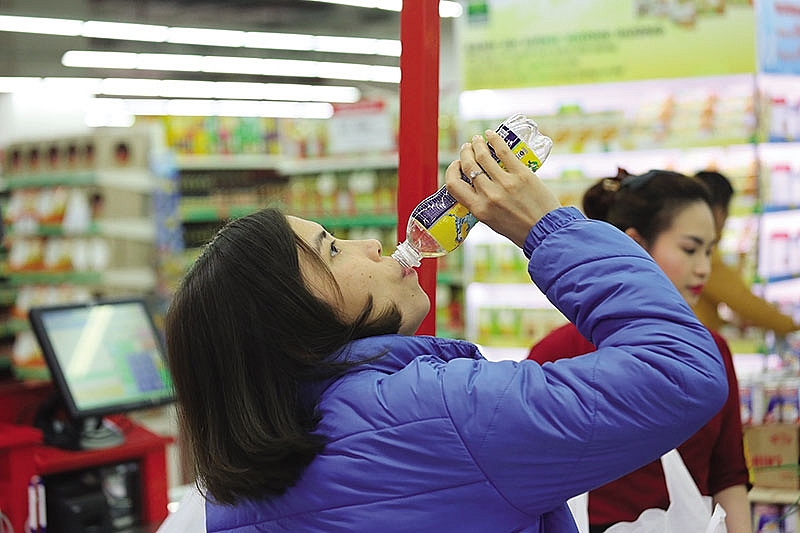URC sales plunged after notorious lead scandal
 |
| URC was forced to make necessary brand changes to its beverages which are popular in Vietnam, Photo: Dng Minh |
According to the latest Universal Robina Corporation (URC) report, it incurred a 21.1 per cent drop in net income in 2017.
“Profitability remained weak as the company faced a decline in volumes and a change in its product mix, particularly relating to the coffee category in the Philippines, as well as a slower-than-expected recovery in Vietnam,” URC said.
URC, the food and beverages unit of the Gokongwei group of companies, is focusing on strengthening its business and hopes to recover its share of Vietnam’s beverage market by 2020.
URC consists of three main divisions, namely snack foods, beverages, and grocery products. The group manufactures and distributes a diverse mix of salty snacks, chocolate, candy, biscuits, baked goods, beverages, noodles, and tomato-based products in the Philippines and throughout Asia. Its green tea beverage C2 and ready-to-drink energy drink Rong Do are popular in Vietnam.
The company faced a price war in the Philippines involving its coffee and salty snack businesses, while its two flagship beverage brands, C2 and Rong Do, were recalled in Vietnam for exceeding the limit for lead content in 2016.
The Vietnamese Ministry of Health announced the imposition of a fine of more than VND5.8 billion ($260,000) for producing and selling lead-contaminated products. According to the ministry, a batch of C2 manufactured on February 4, 2016 and a batch of Rong Do made on November 10, 2015 were found to contain high levels of lead. Test results showed these batches had a lead content of 0.053 to 0.085 milligrams (mg) per litre, definitively above the acceptable limit of 0.05 mg per litre. The lead contamination scandal has damaged the reputation of the company and consumers remain wary of its products.
In order to recover its sales, URC launched a new look for C2 in mid-March stating in a document that the beverage “still keeps to its unique brewing process where it’s brewed and bottled on the same day, ensuring a fresh and authentic drinking experience”, while also focusing on the product’s base of green tea leaves.
Asked about the company’s future strategies for Vietnam’s market, no URC representative was available for comment.
According to Euromonitor International, a leading provider of strategic market research, in 2016, the ready-to-drink tea market recorded declines in both on-trade and off-trade volume and value terms, as both of its leading players, Tan Hiep Phat Group and URC Vietnam, were involved in scandals which affected their reputations and sales. In 2017, as the scandals died down, the segment rebounded, although growth was not as strong as it had been prior to the scandals.
In recent years, Vietnamese customers have become increasingly aware of health and wellness products due to higher rates of diabetes, high blood pressure, and cancer. For this reason, there has been a perceptible shift in preference towards more nutritious drinks with less sugar and caffeine. With higher disposable incomes, many consumers have become more willing to pay extra for healthier products.
What the stars mean:
★ Poor ★ ★ Promising ★★★ Good ★★★★ Very good ★★★★★ Exceptional
Related Contents
Latest News
More News
- State corporations poised to drive 2026 growth (February 03, 2026 | 13:58)
- Why high-tech talent will define Vietnam’s growth (February 02, 2026 | 10:47)
- FMCG resilience amid varying storms (February 02, 2026 | 10:00)
- Customs reforms strengthen business confidence, support trade growth (February 01, 2026 | 08:20)
- Vietnam and US to launch sixth trade negotiation round (January 30, 2026 | 15:19)
- Digital publishing emerges as key growth driver in Vietnam (January 30, 2026 | 10:59)
- EVN signs key contract for Tri An hydropower expansion (January 30, 2026 | 10:57)
- Vietnam to lead trade growth in ASEAN (January 29, 2026 | 15:08)
- Carlsberg Vietnam delivers Lunar New Year support in central region (January 28, 2026 | 17:19)
- TikTok penalised $35,000 in Vietnam for consumer protection violations (January 28, 2026 | 17:15)

 Tag:
Tag:



















 Mobile Version
Mobile Version